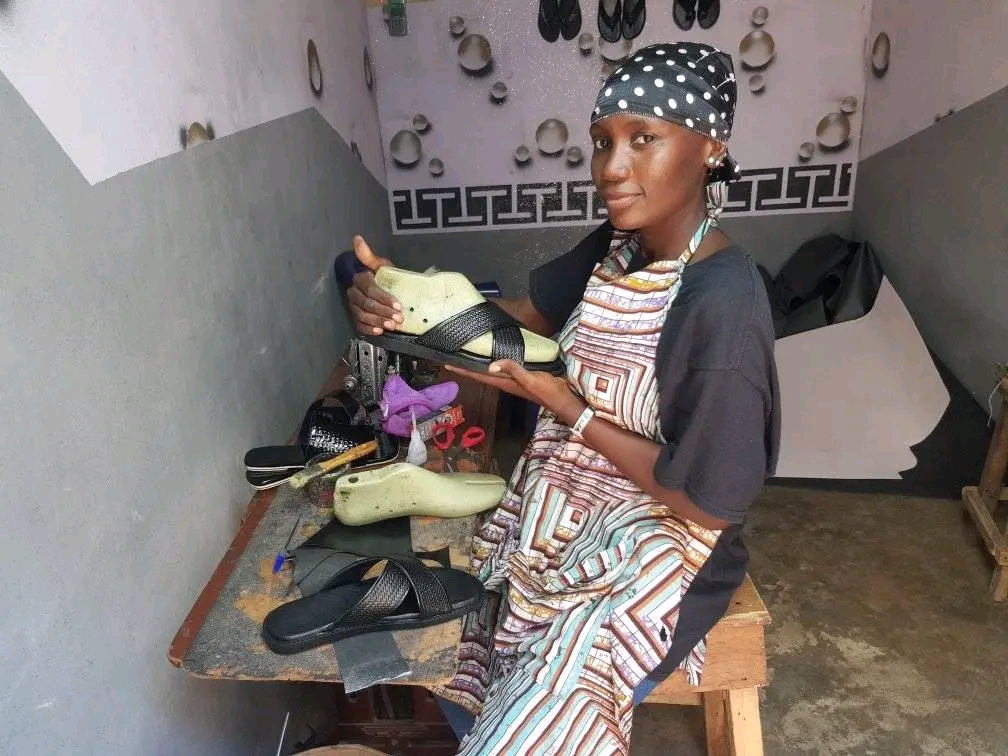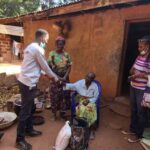Serah Abraham was only 2 years old when she lost her mother, and since then, life has been challenging for the 28-year-old, who grew up under the wings of her father in Numan local government area of Nigeria’s Adamawa State.
Growing up under her father meant that Serah would be shunted between different homes within the neighbourhood every morning her father left for work. Many people also thought that a young girl shouldn’t be left to the care of one man.
“That exposed me to different forms of home training, and after a few years, my father decided to keep me at home under his care. He enrolled me in school while he continued with his work. Most often, I would come back from school and eat the food he had prepared before leaving for work,” Serah said.
In 2008, while in JSS 1, Serah began selling sachet water on the streets of Numan after school hours.
“My father provided the capital so that I could use the profits to cover my expenses when he wasn’t around,” Serah said. “He was always occupied with his work.”
Serah soon took her secondary school examination in 2013, with plans to apply for tertiary education immediately afterwards. But life took a sudden hit as she left secondary school.
Her father fell fatally ill and eventually passed away in 2015. After his death, Serah moved to her paternal aunt’s residence in an adjacent community within Adamawa State.
Left with no anchor of support, Serah began working as a sales attendant in a local pharmacy shop. “I spent 5 years there. Life was tough, and I was just trying to survive,” she recalled.
Around this time, Serah took an interest in shoemaking. Next she quit her job as a sales attendant and used N30,000 from her savings to enroll in a three-month masterclass in shoemaking.
“There were 8 students in the class, and I was the only female. The tutor doubted my abilities, questioning whether I could handle it, but I assured him I could. I persevered and learned every day. Many people discouraged me, saying that this job was for males and that I shouldn’t be involved. Despite the discouragement, I pursued my passion,” Serah explained to Prime Progress.
More often than not, Serah would be besieged by requests to quit her job by customers for whom she designed shoes. However, these offers were rarely ever sincere, as they required an amorous affair in turn.
“These offers were not genuine. They would suggest I quit because it was too difficult for a young and beautiful girl like me. But I always declined and remained focused on my work,” Serah admitted.
After a three-month apprenticeship, Serah became adept at designing various footwear. She didn’t want to return home and stay idle, so she persuaded her tutor to allow her to stay in his shop while she built her own clientele.
Within a year, Serah raised enough money to purchase machinery and open her shop in January 2023.
But becoming her own boss was not a smooth ride. Hikes in the cost of food and transportation are among the challenges she frequently confronts.
“The earnings vary. On good days, we can make between N5,000 and N7,000, but it’s not constant. Sometimes, it’s only N2,000 or N3,000. I also receive contracts for larger shoe orders, which increase my income. Without contracts, I design only 2 to 3 pairs of shoes daily,” Serah explained.
Though Serah admits that her limited funds impede her from expanding her business, she’s excited about owning her shop, with a crop of employers assisting in producing many more unisex shoes.
Currently, she is teaching three female apprentices in the shop and has also trained a male apprentice who has since graduated and is practicing the profession elsewhere.
In the years to come, Serah plans to open a boutique shoe shop and establish a larger shoe factory, under which she can assist more girls like her to earn a living through shoemaking.
“I want to see my shoes sold throughout Nigeria and around the world. I want to help orphans and the less privileged learn this skill for free, so they can support themselves and their loved ones,” she stated.
Serah also advises young girls to understand their aspirations and encourage themselves, even when no one else does.
“To every girl out there, I say, keep pushing towards your dreams, even if no one believes in them. Remember, they are your dreams, not theirs,” she concluded.
Serah Abraham, who lost her mother at the age of two, faced numerous challenges while growing up in Numan, Adamawa State, Nigeria. Raised by her father who juggled work and parenting duties, Serah often found herself shuttled between different homes. Despite early hardships, Serah started selling sachet water in 2008 to support herself financially. By 2013, she completed her secondary education but faced another challenge when her father fell ill and passed away in 2015.
Serah moved in with her paternal aunt and began working as a sales attendant in a local pharmacy. During this period, she developed an interest in shoemaking and eventually enrolled in a three-month masterclass using her savings. Despite skepticism and discouragement from others, she persevered and became proficient in shoemaking. Eventually, Serah saved enough money to start her own shop in January 2023.
Although her earnings vary and she faces financial constraints, Serah remains determined. She currently trains three female apprentices and has previously trained a male apprentice. Serah aspires to open a boutique shoe shop and a larger factory in the future to help more underprivileged individuals gain skills in shoemaking. She emphasizes the importance of self-belief and persistence in pursuing one's dreams, encouraging young girls to stay focused on their goals regardless of external doubts.






